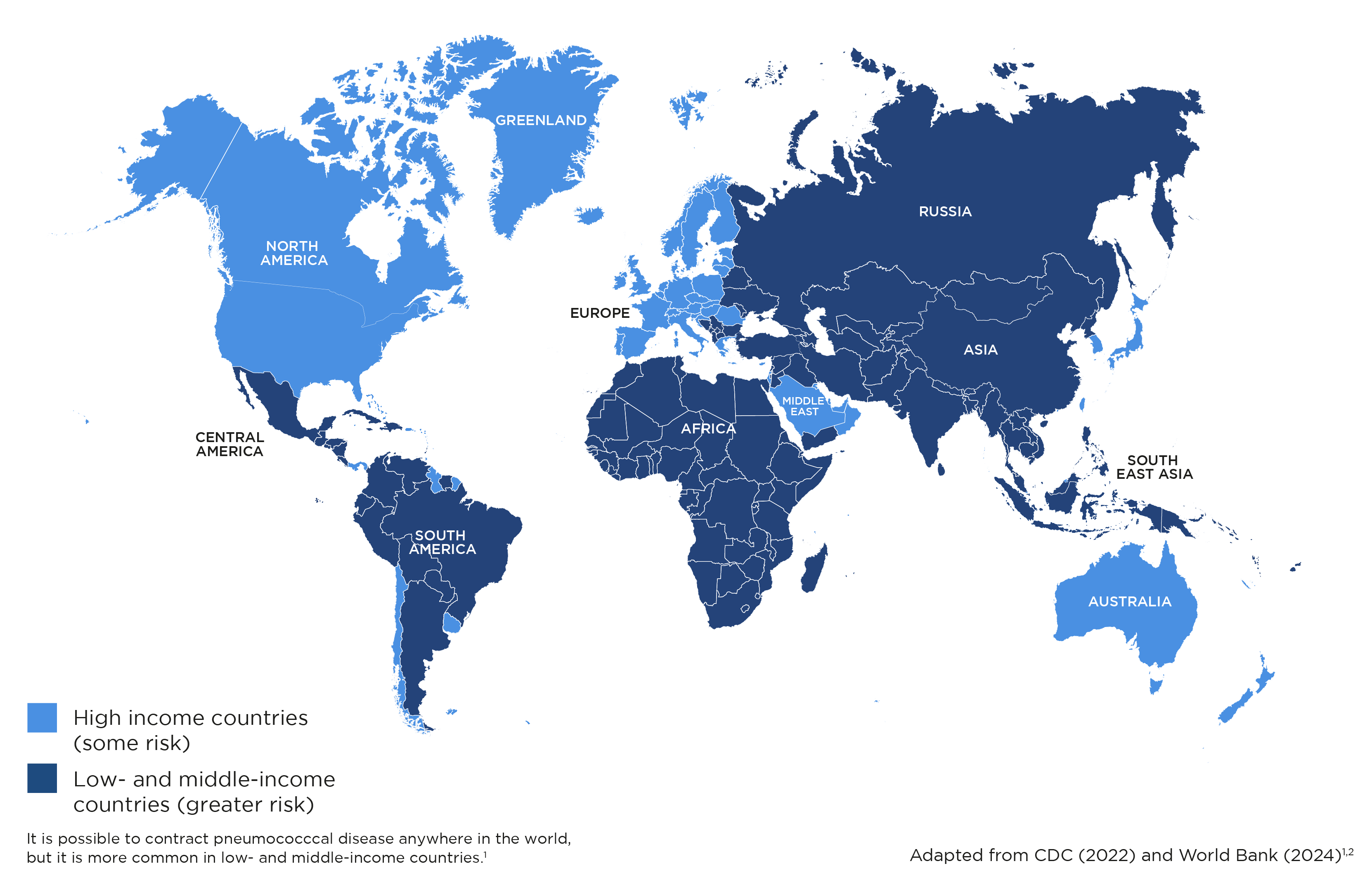The bacteria that causes pneumococcal disease are actually present in the body of up to 90% of healthy people, depending on the population and setting.3
Risk areas for Pneumococcal Disease

FAQs
-
Key fact
-
How do you get pneumococcal disease?
By aerosol (breathing in the bacteria from the air), droplets (sneezing/coughing) or direct contact with the respiratory secretions, like saliva and mucus, of someone carrying the bacteria.4,5 Usually, transmission requires frequent or prolonged close contact.4
-
Which countries are affected by pneumococcal disease?
It is possible to contract pneumococcal disease anywhere in the world, but it is more common in low- and middle-income countries. The disease is more common during winter and early spring in locations with four seasons and during the dry season in tropical climates.1
-
What are the symptoms of pneumococcal disease?
There are many types of pneumococcal infections. Symptoms vary depending on which part of the body is infected.6
Infection in the lungs (pneumonia) can cause fever, chills, cough, breathing difficulty and chest pain.6 Pneumococcal meningitis occurs when bacteria infect the lining of the brain, which can cause headache, stiff neck, fever, confusion and sensitivity to light.6 An infection in the blood can lead to fever, chills and low alertness.6 Infection in the ear is associated with ear pain, swollen ear drum, fever and sleepiness.6 Finally, infection in the sinus is associated with headache, stuffy or runny nose, loss of the sense of smell, pain or pressure in the face, and mucus buildup in the back of the nose and throat.6
-
How serious is pneumococcal disease?
Most pneumococcal infections are mild. However, pneumococcal disease can result in long-term problems and, in severe cases, could be fatal.6
Pneumococcal pneumonia can result in infection around the lungs and into the chest cavity, inflammation of the heart, and obstruction of the airways.6 Pneumococcal meningitis can cause hearing loss and developmental delay an is the most likely to be fata, with 1 in 12 case in children and 1 in 6 cases in older adults causing death.6 Infection of the blood can lead to loss of limbs.6 Ear infections are more common and usually mild, and complications are rare following a pneumococcal sinus infection.6
-
Can I prevent getting pneumococcal disease?
You can take the following precautions to help reduce your risk of infection:
- Visit your nearest convenient pharmacy or specialist travel health clinic for a risk assessment before your trip
- Wash your hands thoroughly and regularly, especially after touching your face and before handling food7
- Coughing and sneezing into a tissue, and then disposing of it and washing your hands immediately7
- Not sharing cups or kitchen utensils with others7
Ready to get started? Check now for your nearest travel health clinic.
Get friendly advice from the UK's largest network of travel clinics*.
* This list is not exhaustive and other travel health providers are available.
References
- Centers for Disease Control and Prevention. Travelers’ Health: Pneumococcal Disease. September 2022. Available online: https://wwwnc.cdc.gov/travel/diseases/pneumococcal-disease-streptococcus-pneumoniae. (Last accessed March 2024).
- World Bank. World Bank Country and Lending Groups. 2024. Available online: https://datahelpdesk.worldbank.org/knowledgebase/articles/906519-world-bank-country-and-lending-groups. (Last accessed March 2024).
- Centers for Disease Control and Prevention. Pneumococcal Disease: Streptococcus pneumoniae. January 2022. Available online: https://www.cdc.gov/pneumococcal/clinicians/streptococcus-pneumoniae.html. (Last accessed March 2024).
- UK Health Security Agency. The Green Book. Chapter 25 – Pneumococcal. July 2023. Available online: https://assets.publishing.service.gov.uk/media/64d68d6edd15ff000d278019/Green_Book_Chapter_25_Pneumococcal_27_7_23.pdf. (Last accessed March 2024).
- Centers for Disease Control and Prevention. Pneumococcal Disease: Risk Factors and How It Spreads. September 2023. Available online: https://www.cdc.gov/pneumococcal/about/risk-transmission.html#print. (Last accessed March 2024).
- Centers for Disease Control and Prevention. Pneumococcal Disease Symptoms and Complications. May 2022. Available online: https://www.cdc.gov/pneumococcal/about/symptoms-complications.html. (Last accessed March 2024).
- NHS Inform. Pneumococcal Infections: Preventing Pneumococcal infections. December 2023. Available online: https://www.nhsinform.scot/illnesses-and-conditions/infections-and-poisoning/pneumococcal-infections/#preventing-pneumococcal-infections. (Last accessed March 2024).
UK-BOTB-2400001 (v1.0) March 2024
